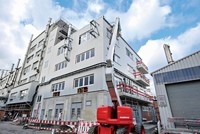Advertisement
Grab your lab coat. Let's get started
Welcome!
Welcome!
Create an account below to get 6 C&EN articles per month, receive newsletters and more - all free.
It seems this is your first time logging in online. Please enter the following information to continue.
As an ACS member you automatically get access to this site. All we need is few more details to create your reading experience.
Not you? Sign in with a different account.
Not you? Sign in with a different account.
ERROR 1
ERROR 1
ERROR 2
ERROR 2
ERROR 2
ERROR 2
ERROR 2
Password and Confirm password must match.
If you have an ACS member number, please enter it here so we can link this account to your membership. (optional)
ERROR 2
ACS values your privacy. By submitting your information, you are gaining access to C&EN and subscribing to our weekly newsletter. We use the information you provide to make your reading experience better, and we will never sell your data to third party members.
Business
Evonik Plans Nylon 12 Plant For Singapore
20,000 metric tons of specialty automotive polymer to be produced annually
by Alexander H. Tullo
July 12, 2012
| A version of this story appeared in
Volume 90, Issue 29
Evonik Industries has picked Singapore as the location of a new plant for nylon 12, a specialty polymer used to make automotive brake and fuel lines. The company announced the decision as it attempts to recover from a plant explosion that has severely limited supplies of the polymer.
The Singapore plant will have 20,000 metric tons of annual capacity and should be completed in 2014, Evonik says. The company currently makes nylon 12 in Marl, Germany.
Nylon 12 supply was already tight on March 31 when an explosion occurred at an Evonik plant in Marl that makes cyclododecatriene (CDT), a critical precursor for nylon 12. Two workers were killed in the explosion. The plant supplies both Evonik and Evonik’s main rival in nylon 12, Arkema.
Weeks after the accident, automakers and their parts suppliers convened an emergency meeting near Detroit over a looming nylon 12 shortage (C&EN, April 23, page 6). There, Evonik and Arkema offered customers substitute nylons. That same month, the auto industry drafted guidelines for the fast-track approval of nylon 12 replacements in applications such as connectors and multilayer tubing.
Evonik says the CDT plant should be repaired in the fourth quarter, enabling nylon 12 supplies to return to normal soon thereafter.
With inventories of nylon 12 now waning, many consumers will have to resort to alternative materials this summer, says Paul Blanchard, North American director of engineering resins for the consulting group IHS Chemical. “System suppliers are engaged in submitting testing results to their customers to obtain fast-track approvals for substitute materials,” he says. The industry, he notes, was looking for nylon 12 alternatives even before the explosion because tight supply drove up prices.





Join the conversation
Contact the reporter
Submit a Letter to the Editor for publication
Engage with us on Twitter